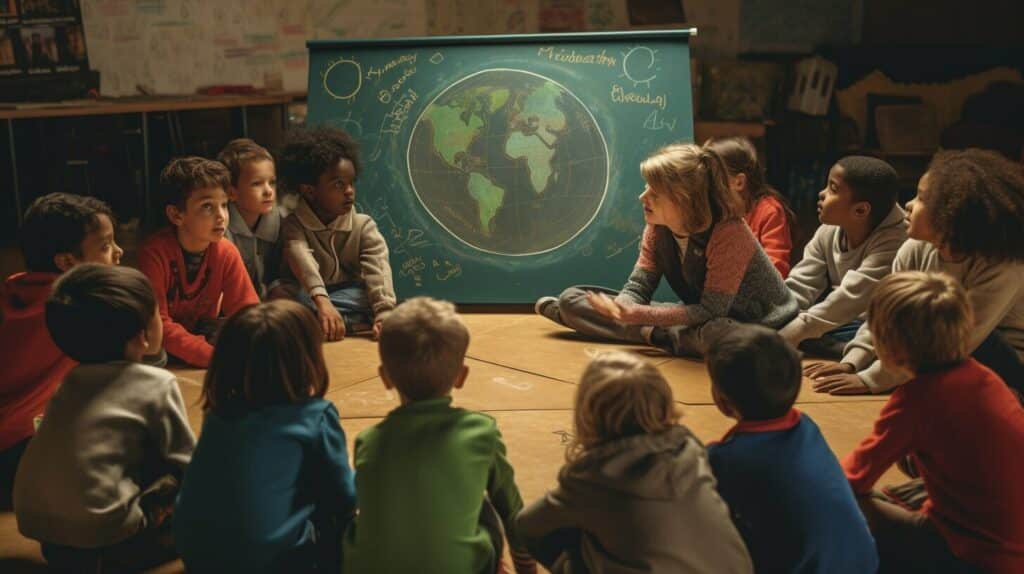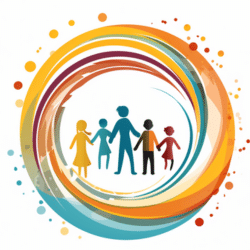Explaining complex political ideologies to children can be a daunting task, but it is important to encourage open-mindedness and critical thinking from a young age. Communism may seem like a complicated system, but with the right approach, you can help your child understand its principles in a relatable manner.
In this guide, we will break down the key concepts of communism into age-appropriate explanations, explore its pros and cons, and provide real-life examples of its principles in action. By the end of this article, you will have a better understanding of how to explain communism to a child.
Key Takeaways:
- Explaining communism to a child requires breaking down complex concepts into relatable terms.
- Understanding political ideologies is the foundation for explaining communism to a child.
- Communism emphasizes shared ownership, equality, and cooperation.
- Real-life applications of communist principles can be seen in sharing resources and community projects.
Understanding Political Ideologies
Before delving into communism, it’s important to have a basic understanding of political ideologies. Politics is all about how societies are organized, and political ideologies are different ideas about how this should be done.
For instance, some people believe that societies should be built around the principles of democracy, where everyone has a say in how things are run. Others believe that societies should be structured around preserving tradition and stability. Still, others maintain that societies should be based on equality and fairness.
Political ideologies are ways of looking at the world, and how it should be organized, which often challenge one another. As you learn about communism, it’s important to remember that different people have different beliefs about how societies should be run, and that it’s okay to have different opinions!

What is Communism?
Communism is an idea about how society can be organized, where everyone works together and shares everything equally. In a communist system, there is no private property, and everything belongs to everyone. This means that everyone has an equal say in how things are done, and everyone benefits from the wealth that is created.
Communism is based on the idea that everyone should have access to the resources they need to live a good life, no matter who they are or what they do. This includes things like food, housing, and healthcare. People who support communism believe that everyone should work together to create a fair and equal society, where everyone has an equal opportunity to thrive.

Think of it like this: imagine you and your friends are playing a game, and you all agree to share your toys equally. Everyone gets to play with everything, and no one feels left out. That’s kind of like how communism works, but on a much bigger scale.
Key Features of Communism
Communism has many unique features that distinguish it from other political ideologies. Here are some of the main principles:
| Feature | Description |
|---|---|
| Absence of Private Property | In a communist system, there is no private ownership of property or means of production. Everything is owned collectively by the community. This means that everyone has equal access to resources and nobody can accumulate wealth at the expense of others. |
| Central Planning | Communism relies on central planning to distribute resources and allocate goods and services. This ensures that everyone’s needs are met equally, rather than leaving it up to the market to determine who can afford what. |
| Classless Society | Communism aims to create a classless society where everyone is equal and there is no hierarchy. This includes the elimination of social classes, such as the working class and the bourgeoisie, and the end of exploitation and oppression. |
It’s important to note that these features are often implemented differently in various communist systems and the degree to which they are upheld can vary greatly.
But why would someone support a system like communism? Let’s explore some of the reasons in the next section.

Comparing Communism with Other Systems
It’s important to understand that there are different political ideologies, or ways of thinking about how societies should be organized. Communism is just one of them. To compare communism with other systems, let’s take a look at socialism.
Socialism is another type of political ideology that believes in creating a more equal society by redistributing resources and wealth. Like communism, it aims to eliminate social classes and promote cooperation and shared ownership. However, unlike communism, socialism doesn’t necessarily call for the complete elimination of private property or a centralized government.
A simplified way to think about the difference between communism and socialism is that communism seeks to abolish private property and create a classless society, while socialism seeks to mitigate the effects of capitalism and create a more equal society through policies such as social welfare programs and progressive taxation.
 Image source: seowriting.ai
Image source: seowriting.aiExamples of Communism in History
Communism has been implemented in several countries throughout history, with varying degrees of success. Here are some simplified examples to help you understand:
| Country | Communist Leader | Years of Communist Rule |
|---|---|---|
| Soviet Union | Vladimir Lenin, Joseph Stalin | 1917-1991 |
| China | Mao Zedong | 1949-1976 |
| Cuba | Fidel Castro | 1959-Present |
Communism can be difficult to maintain in practice, as it requires a high degree of cooperation and shared responsibility. However, these examples show that it is possible to govern using communist principles, at least in theory.
It is important to note that not all countries that claim to be communist practice true communism, and many have faced criticism for their handling of human rights and political freedoms.
 Image source: https://seowriting.ai/32_6.png
Image source: https://seowriting.ai/32_6.pngPros and Cons of Communism
Now that you have a basic understanding of communism, it’s important to know that while it has its advantages, there are also some criticisms to consider. Here are some potential pros and cons of this political ideology:
| Pros | Cons |
|---|---|
| Equality: Communism aims to create a classless society where everyone has equal access to resources and opportunities. | Lack of Incentive: Critics argue that without the promise of individual rewards, people may not be motivated to work hard and be productive. |
| Cooperation: The idea of working together for the common good is an attractive one, which could lead to increased social harmony. | Lack of Freedom: Critics suggest that communism can limit individual freedom, with the government controlling many aspects of people’s lives. |
| Social Justice: Communism emphasizes the importance of social justice, supporting those who are in need, and creating a fairer society. | Inefficiency: Some argue that central planning can lead to inefficiencies in the economy, as resources may not be allocated as efficiently as in a market-based system. |
As you can see, there are both positive and negative aspects to communism. It’s up to you to decide what you think about it!
Pros and Cons of Communism
“The basic ideas of communism are not a threat to anyone. It is the twisted application of those ideas in the real world that has caused untold suffering and misery.”

Criticisms of Communism
While communism may seem like an appealing idea at first glance, it is not without its detractors. Let’s take a look at some of the common criticisms of this political ideology:
| Criticism | Explanation |
|---|---|
| Lack of Incentive | Critics argue that without private property and profit incentives, individuals will lack the motivation to work hard and innovate. They believe that communism stifles individual creativity and initiative. |
| Government Overreach | Some people fear that communist governments have too much control over citizens’ lives, with little room for dissent or disagreement. They worry about a lack of freedom and democracy under a communist system. |
| Ignoring Human Nature | Critics argue that communism ignores the basic human desire for individuality and competition. They believe that it goes against human nature to strive for equality at the expense of personal freedom and ambition. |
| Economic Inefficiency | Some economists argue that communism is an inefficient system, as it relies on central planning rather than market forces to allocate resources. They believe that this leads to shortages, waste, and inefficiencies in production. |
While these criticisms may have some validity, it’s important to keep an open mind and consider different perspectives. By understanding the critiques of communism, you can better evaluate its strengths and weaknesses.
In the end, the decision of whether or not to support communism is a personal one that should be made based on careful consideration of all the facts.

Why Do People Support Communism?
Now that you have a basic understanding of what communism is and its key features, you may be wondering why some people support this political ideology. Here are a few reasons:
- Desire for fairness: One of the main principles of communism is that everyone should have equal access to resources and opportunities. This idea resonates with many people who believe that everyone should have a fair chance to succeed, regardless of their background.
- Belief in social justice: Communism seeks to create a more equal society by redistributing wealth and power. This idea appeals to people who see injustice and inequality in the world and want to do something about it.
- Wish to provide equal opportunities for everyone: Communism believes that no one should be left behind and that everyone should have access to education, healthcare, and other basic needs. This resonates with people who believe that everyone should have a chance to reach their full potential.
Of course, not everyone agrees with communism, and there are many criticisms of this system. In the next section, we’ll explore some of the most common criticisms of communism and how to explain them to children.

Real-Life Applications of Communist Principles
Communism may seem like a complex political ideology, but its principles are not all that foreign to our everyday lives. In fact, some principles of communism can be seen in the way we interact with others and in our communities.
For example, sharing resources is a key component of communism. You may have experienced this when sharing toys or snacks with friends or siblings. When we share, we are promoting equality and working together towards a common goal.
Another important communist principle is cooperation. Think about how teams work together to achieve a goal, or how families work together to keep the household running smoothly. By cooperating, we are promoting a classless society where everyone is valued equally.
Community projects also reflect communist principles. When a group of people come together to clean up a park or help those in need, they are working towards a common goal and promoting cooperation and equality.

Conclusion
Congratulations! You’ve reached the end of this friendly guide on how to explain communism to a child. Now, you should have a better understanding of what communism is, its key features, and its pros and cons.
Remember, teaching children about different political ideologies like communism is important for promoting open-mindedness and critical thinking. By understanding different perspectives and being able to discuss them, children can become well-informed citizens who contribute positively to society.
So, take some time to reflect on the information presented in this guide and think about how you can share it with your child or the children in your life. Encourage them to ask questions and share their own thoughts and opinions.
Keep Learning!
If you’re interested in learning more about communism or other political ideologies, there are many resources available online and in print. Keep exploring and expanding your knowledge, so you can continue to have informed discussions with your child or others.
Can You Explain Capitalism and Communism in a Child-Friendly Way?
Can You Explain Capitalism and Communism in a Child-Friendly Way? Teaching kids about economic systems can be challenging, but how to teach capitalism to kids can be simplified. Imagine a playground where everyone has their toys. In communism, all toys are shared equally. In capitalism, each child keeps their own toys and can trade or sell them. Both have pros and cons, but learning about different systems is important for understanding the world.
FAQ
Q: How do I explain communism to my child?
A: Explaining communism to a child can be done by emphasizing shared ownership, equality, and cooperation. You can explain that communism is a system where everyone works together and shares resources, so that everyone has what they need.
Q: What are some key features of communism?
A: Some key features of communism include the absence of private property, central planning, and a classless society. This means that everything is owned collectively, decisions are made by the government, and there are no social classes.
Q: How does communism compare to other systems?
A: Communism is similar to socialism, but it differs in the extent of government control and ownership. Socialism focuses more on providing social services and reducing income inequality, while communism goes further by advocating for a completely classless society.
Q: Can you give some examples of communism in history?
A: Some examples of countries that have implemented communist systems in the past include the Soviet Union and China. You can think of it like everyone in a big family sharing everything they have.
Q: What are the pros and cons of communism?
A: Communism has the potential to promote equality and cooperation among people. However, it can also face challenges in terms of individual freedoms and economic efficiency.
Q: Are there any criticisms of communism?
A: Yes, some common criticisms of communism include concerns about the lack of personal freedoms and the potential for a lack of motivation to work hard when everyone benefits equally.
Q: Why do some people support communism?
A: Some people support communism because they believe in fairness, social justice, and providing equal opportunities for everyone. They think that everyone should have an equal chance to succeed.
Q: Where can we see communism principles in everyday life?
A: Communist principles can be seen in sharing resources, cooperation within teams, families, and community projects. These principles encourage working together to ensure everyone’s needs are met.






